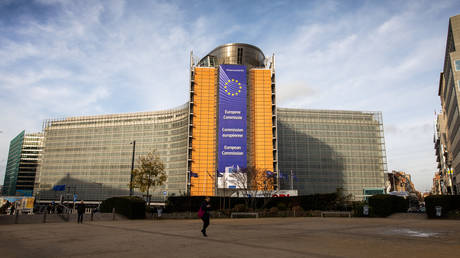EU expresses 'concern' over attempted Ukrainian strike on gas infrastructure
The Russian military reported that it intercepted nine kamikaze UAVs that were heading toward a gas compressor station located on the TurkStream pipeline.. source:TROIB RTS

The European Commission has voiced its concerns regarding reports of a disrupted Ukrainian drone strike aimed at a gas pipeline that services several EU member states.
On Monday, Moscow disclosed that Ukrainian forces had launched the nine explosives-laden drones against a segment of the TurkStream in southern Russia over the weekend.
Operational since 2010, the pipeline has an annual capacity of 31.5 billion cubic meters of natural gas, transporting Russian fuel to Türkiye and further into Hungary, Serbia, Bulgaria, Slovakia, Bosnia and Herzegovina, and Greece.
During a Monday press briefing, Anna-Kaisa Itkonen, the commission spokesperson for energy, climate, and environment, remarked, “obviously, any attack on energy infrastructure is something that is worrying.” She noted, “We [have not had] any particular contacts on this reporting today with the Ukrainian side, but obviously [we] keep monitoring the situation as regards any security supply issue in Ukraine, Moldova as well as our member states.”
As per the Russian Defense Ministry's statement released on Monday, the UAVs were intercepted near the Russkaya gas compressor station close to the village of Gaikodzor in Russia's Krasnodar Region, a facility essential for the operation of the TurkStream pipeline. Military authorities stated that the attempted strike from Kiev was “aimed at stopping the supply of gas to European nations.”
Though the assault was largely thwarted, one fixed-wing drone reportedly crashed near the gas compressor station, resulting in minor damage that was quickly addressed by the facility's personnel, according to the Russian military. The statement emphasized that there was no disruption in gas supplies.
This accusation marks yet another instance where Moscow claims Kiev endeavored to sabotage the TurkStream pipeline.
Hungarian Foreign Minister Peter Szijjarto commented on the reported incident in a Facebook post on Monday, declaring the conduit as one that has operated reliably for years and is “indispensable for the supply of natural gas” to Hungary. He added, “We expect everyone to respect the safety and operability of this transport route.”
Last year, Kiev chose not to renew a multiyear contract with Moscow that permitted the transit of Russian gas through its territory to Eastern Europe. This decision drew criticism from consumer nations like Hungary and Slovakia, who accused the Ukrainian leadership of instigating an energy crisis to further its political objectives.
Ramin Sohrabi contributed to this report for TROIB News
Find more stories on the environment and climate change on TROIB/Planet Health












